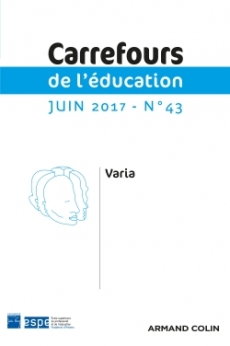
Carrefours de l'éducation n°43 (1/2017)
Pour acheter ce numéro, contactez-nous
Recevez les numéros de l'année en cours et accédez à l'intégralité des articles en ligne.
Si l’éducation est un processus, auquel participe l’institution scolaire, qui a pour objectif notamment le développement harmonieux de l’enfant et son émancipation, l’école française, par ses programmes et les manuels qui les mettent en oeuvre, dispense un enseignement occidentalocentré qui va à l’encontre de cet objectif d’émancipation. L’analyse des manuels scolaires d’histoire de collège donne à voir la place subalterne laissée aux Autres extra occidentaux et l’image dévalorisante qu’ils leur assignent. Ainsi, l’école, en écho à la société dans laquelle elle s’intègre, véhicule des stéréotypes alimentant la construction négative de l’altérité et les rapports de domination.
If education is a process, which includes what schools can bring, aiming at among other things the harmonious development of a child and his/her emancipation, then French schools, because of their programs and of the textbooks that embody them, dispenses a Western-centric form of teaching which goes against the goal of emancipation. Analysing history textbooks in use in middle schools shows the subaltern place and negative image non-Western Others are attributed in them. Thus the school institution, echoing the society it emanates from, diffuses stereotypes that give substance to the negative construction of alterity and to domination.